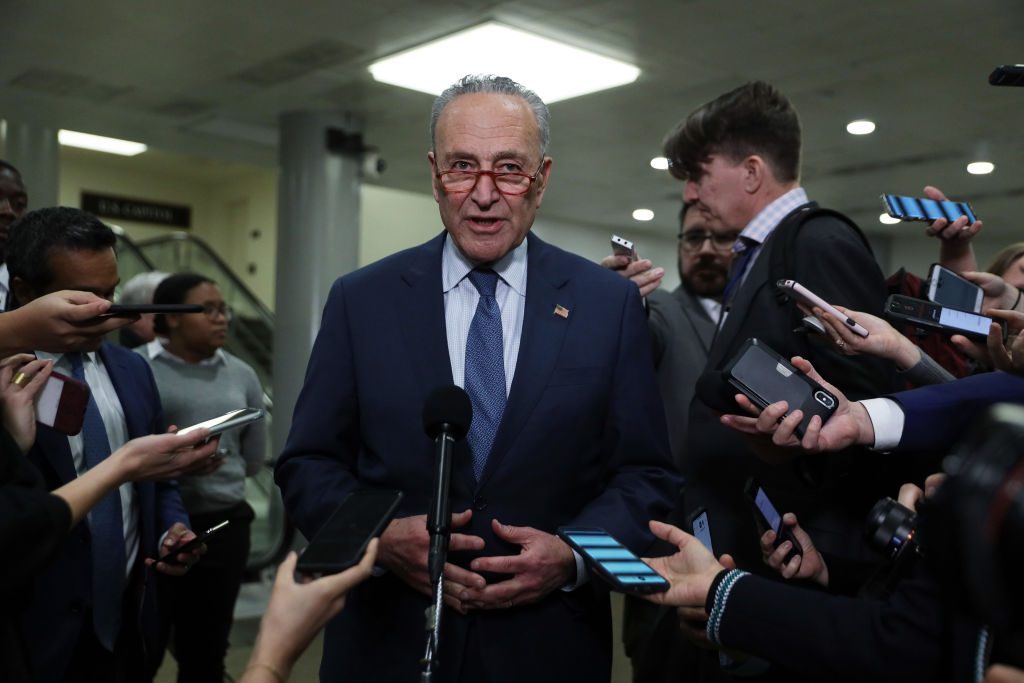Lazy Reporters Parrot Democrats’ Talking Points on Impeachment

As the Senate impeachment trial of President Donald Trump got underway Tuesday, one theme emerged that will likely haunt the proceedings: the media betrayed a complete inability to understand trial procedure. Instead reporters lazily parroted Democratic talking points without any context or analysis.
Reporting on the impeachment proceedings got off to a rocky and inaccurate start Monday evening when news reports conflated two key issues at stake in the impeachment trial: the rules for said trial and whether Senate Majority Leader Mitch McConnell would call witnesses or consider House evidence.
“McConnell Maps Late-Night, Evidence-Free Impeachment Trial,” blared a Courthouse News headline.
This continued throughout the day Tuesday. Despite the fact that the Senate was considering a rules vote governing procedure in the trial, Democrats like Senator Chuck Schumer and Congressman Adam Schiff used their time to falsely claim that Republicans were denying them a chance to subpoena witnesses.
A vote on evidence to be admitted was needed before the rules vote because the public “deserves the full truth,” Democrats argued.
“The documents will also show us how key players inside the White House, such as the president’s acting chief of staff Mick Mulvaney, his deputy Robert Blair, and former national security adviser John Bolton helped set up the [Ukraine] deal by executing the freeze on all military aid and withholding a promised visit to the White House,” Congresswoman Zoe Lofgren said. “The documents include records of the people who may have objected to this scheme, such as Ambassador Bolton. This is an important impeachment case against the president.”
House impeachment managers were assisted in their misdirection efforts by complicit members of the media.
“GOP rejects effort to compel documents on delayed Ukraine aid,” reads a headline in The Hill.
But that’s not what happened during Tuesday’s proceedings—nor does it accurately reflect the Senate Republican position. McConnell has said, and other Republican senators have affirmed, that votes on whether the Senate will call additional witnesses will take place after senators have heard the presentations made by House prosecutors and White House counsel, and senators have had time to ask their questions.
In other words, McConnell followed through on what he promised to do from the beginning: to adhere to the rules that were agreed upon by both Republicans and Democrats during the impeachment trial of President Bill Clinton, where both sides presented their opening arguments before a vote was taken on evidence and witnesses.
Despite the spin Democrats are currently putting on events, it is important to remember that the McConnell rules “do not forbid additional witnesses or documents,” constitutional attorney Bruce Fein told The American Conservative. The rules state “only that there will be votes as to whether to do so…. [The] Clinton [impeachment trial] rules did not [include an] open-ended right to have additional witnesses and documents.”
The Senate did vote 53-47 on Tuesday to table Senator Chuck Schumer’s amendment, which would have added language requiring the White House to turn over documents related to Ukraine aid to the rules resolution.
The media also trumpeted Tuesday an alleged retreat by McConnell, which is almost exactly the opposite of what actually took place.
“McConnell softens hard-line tactics on Trump trial,” a Politico headline reads, while an AP headline proclaims, “McConnell backs off, abruptly eases impeachment trial limits.”
This phrasing casts small changes made to a first draft of rules as a major victory for Democrats, when it was actually done at the request of Senator Susan Collins and the handful of Republican senators who hold all the cards in the impeachment proceedings.
“Collins and others raised concerns about the 24 hours of opening statements in 2 days and the admission of the house transcript is the record,” Collins spokeswoman Annie Clark said in a statement. “Her position has been that the trial should follow the Clinton model as much as possible. She thinks these changes are a significant improvement.”
In response to Collins’ concerns, McConnell changed a provision in the rules that would have required White House lawyers and House prosecutors to make 24 hours of legal arguments in just two days. The modified resolution will grant each side 24 hours to speak over the course of three days, potentially extending the length of the trial by two days. Collins also succeeded in having the House impeachment record entered into evidence.
A lot of what happens in this trial will come down to the Republican senators who are persuadable and could be swing votes, namely Senators Susan Collins, Lisa Murkowski, Mitt Romney, and Lamar Alexander. After the opening arguments are completed, these senators will likely vote in favor of motions to allow additional witnesses and documents. Even the most hardcore Republicans in the Senate, like Texas Senator Ted Cruz, have not ruled out calling additional witnesses.
Remember that when you see the media regurgitating Democrat talking points.